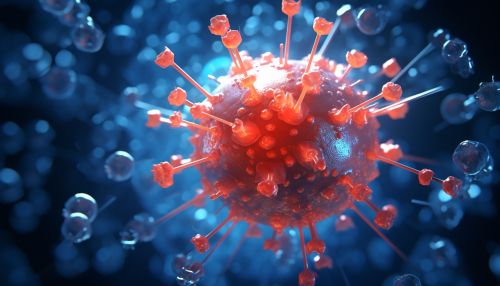T cell
Introduction
T cells, also known as T lymphocytes, are a type of white blood cell that play a central role in the immune response. They are named after the thymus, an organ in the upper chest where they mature. T cells can be distinguished from other lymphocytes, such as B cells and natural killer cells, by the presence of a T-cell receptor on the cell surface.
Types of T cells
There are several different types of T cells, each with a unique function in the immune response.
Helper T cells
Helper T cells, also known as CD4+ T cells, assist other white blood cells in immunologic processes. This includes enhancement of B cells to produce antibodies and stimulation of cytotoxic T cells and macrophages. These cells are also central in activating and directing other immune cells.
Cytotoxic T cells
Cytotoxic T cells, also known as CD8+ T cells, are a type of T cell that kills cancer cells, cells that are infected (particularly with viruses), or cells that are damaged in other ways.
Regulatory T cells
Regulatory T cells, formerly known as suppressor T cells, are crucial for the maintenance of immunological tolerance. Their major role is to shut down T cell-mediated immunity toward the end of an immune reaction and to suppress auto-reactive T cells that escaped the process of negative selection in the thymus.
Memory T cells
Memory T cells are a subset of antigen-specific T cells that persist long-term after an infection has resolved. They quickly expand to large numbers of effector T cells upon re-exposure to their cognate antigen, thus providing the immune system with "memory" against past infections.
T cell development
T cells originate from hematopoietic stem cells in the bone marrow. These progenitor cells migrate to the thymus, where they undergo a series of developmental stages to become mature T cells. This process is known as T cell differentiation.
T cell activation
T cells are activated when they encounter antigen-presenting cells (APCs) displaying a molecular complex that the T cell recognizes. This complex is composed of an antigen peptide bound to a molecule of the major histocompatibility complex (MHC). The T cell's recognition of this complex is the first step in the process of T cell activation.
Role in immune response
T cells play a key role in the immune response, coordinating the actions of other immune cells and directly attacking infected or cancerous cells. They are essential for the adaptive immune response, which provides the body with the ability to recognize and remember specific pathogens and to mount stronger attacks each time the pathogen is encountered.
T cells and disease
T cells are implicated in a number of diseases, including autoimmune diseases, cancer, and infectious diseases such as HIV/AIDS. In many of these conditions, the normal function of T cells is disrupted, leading to a weakened immune response.
See Also


